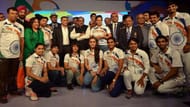Had it been normal times, a 100-member-strong Indian side would have been fighting it out for medals in the 2020 Tokyo Olympics. Every medal counts for the country whose performance till date has been far below its potential in the world’s most competitive sporting platform.
In fact, by now, Olympics 2020 would have completed its first week and we would have been in the last week of the event. By now, it would have been clear as to whether we are going to improve upon our performance from the London Olympics 2012 in terms of the medal count. In the London Olympics, India got 2 silver and 4 bronze medals and stood at the 56th position amongst the competing nations.
In our mainstream media by now, several rounds of debates and discussions would have filled the prime time space. We would have chased the medal winners, who could have been counted on fingers, and turned them to overnight heroes. Apart from the heroes, all the rest including the system in itself would have been turned into villains with an endless amount of postmortem done.
What ails Indian sports and what needs to done to make the country having around 140 crore people a strong sports power? This would have been the favorite topic of discussion. Having been in leadership roles in different private channels, I myself have been instrumental in all these discussions in the past.
What is happening now?

These are definitely not normal times. The world is fighting a once-in-a-century pandemic and a large proportion of the battle is yet to be won.
Shooting was India’s biggest hope in the Olympics. Our shooter Anjum Moudgil has swapped her rifle with a paint brush these days. She has been selling her paintings to help those financially affected by the pandemic.
18-year-old pistol shooter Saurabh Chaudhary, who is the world No. 4 in the sport, is training in the cowshed shooting range at his home in Uttar Pradesh in Kalina. He knows quite well that sooner or later, his time will come. Till then, the promising teenager is unwilling to take his eyes away from his eventual target.
We don’t know whether or not we will ever have someone like Michael Phelps in swimming. But someone like Srihari Natraj definitely has given us the hope that our swimmers could still compete on the highest level with the best. Natraj, who is strumming a guitar these days, rues the time lost in the lockdown.
'I expected a lot of drop in my timings in the last six months. Now it is going to take me another four to five months to make up for it. And from now till the next guidelines come out in September, I will waste one more month of my career waiting,' says Srihari Natraj.
Professional sports and the professional system will do well to take a cue from boxers' lives. Though one may be fully equipped in the arena, one should know when to hold back from giving the punch and when to throw a punch to be successful.
Boxer Lovelina Borgohain is sowing paddy near to her house at Golaghat in Assam. As if the coronavirus was not enough, her state Assam is going through floods which have destroyed the lives and livelihood of many. Like a true boxer, she is waiting for life to return to normal so that the others could resume their lives and she could put on her boxing gloves and be in the ring again.
Lawyers are supposed to be experts in wearing different hats on different occasions. Shooter Abhishek Verma is planning to start his law practice in Delhi. A lawyer by profession, a few days ago, he received the much needed license from the Bar Council of India.
"The Olympics are a year away and there are no competitions this year. So after daily training, I hope to start my practice simultaneously," he says.
What separates archer Deepika Kumari from becoming a true great in the Indian sports is an Olympic medal. She has been to the Olympics twice without success and she was aiming to make Tokyo 2020 count.
But she has been spending her days in the last four months watching TV, doing yoga, cooking and mopping the floor. Kumari is missing the pressure, excitement and drama which would have accompanied her life had Olympics taken place as schedule, but she is waiting for the right time to start again.
As the representatives of the mainstream media, we need to ask ourselves a question. We would have gone berserk, for and against many of these athletes, had Tokyo Olympics 2020 had been happening as scheduled right now.
But since it’s not happening, are we even bothered about what they are doing right now? Are we even concerned about the state of the mind in which most of the athletes are in in these challenging times? Barring rare exceptions here and there, most of us definitely are not.
We need to understand that the making of the champion is not once-in-four-years event management cycle, but a continuous process which goes on twenty four into seven and three hundred and sixty five days a year.
Sangram Singh, a former international wrestler and now a television personality and motivational speaker, hits the bulls-eye when he says:
"We need to focus our efforts at the grass-root level consistently, if we want to see the champions emerging at the top level on the consistent basis. But since, working at the grass-root level is seen as the thankless work and time taking process by the influencers in the sporting ecosystem, we take the short cut of treating the medals won and medals lost in the Olympics as the event management process."
What is Sangram Singh himself doing these days?
When the lockdown began, he locked himself down in Ahmadabad. A fitness freak, he started working harder than before on his body and mind within the closed confines of his home there. He started talking to many of these athletes who were feeling down and out.
Gradually, he started engaging them in conversations in a series of shows aptly named ‘Hauslon Ki Udaan’. Being someone who has seen so many adversities right from his childhood, Sangram Singh soon realized that something more concrete has to be done.
Sangram came to his ancestral village in Madina in Haryana. A few days ago, when I went to his village, I saw him training and teaching the local kids the nuances of wrestling in the two akharas which are near his home.
The energy, enthusiasm and eagerness to train have to be seen in the eyes of the aspiring wrestlers to be believed. They are training with a professional wrestler who started from where they are starting now and made it big in whichever field he chose.
From policy making to the execution stage, the Indian sporting ecosystem would require many such efforts at the grassroots level on a consistent basis if we want to see ourselves as a strong sporting nation.
What should the Indian media do?

In the short run, we need to engage with the athletes, keep them motivated and give them confidence as they try to unlock themselves and prepare for the Olympics 2021. Though the unlocking has started, the time from here to the Olympics 2021 is going to be equally if not far more challenging.
Many questions will be entering their mind space as they train for the event. Will the Olympics be possible next year? Japan has largely controlled the coronavirus. However, a large part of the rest of the world, which includes United States, Brazil and India, has not.
A year before the rescheduled games, this is still a major problem. The unpredictable nature of the virus is making it impossible for officials to say definitively whether the games will happen or not.
And if they do happen, what will it look like? Will there be spectators? Maybe those only those from within Japan will be allowed to come and see the Games. Will athletes from all across the world be participating? Will some of the countries refuse to send in their athletes? The best case scenario is that we do have the vaccine by the end of the year, but even then, the deadline will be too short.
Caution first and Games later seems to be the overwhelming public sentiment within Japan right now. In a recent survey done by Ashahi Shimbun, one of Japan’s largest daily newspapers, 59% of those polled said they wanted the Olympics to be postponed again or cancelled.
The only major positive is that Yuriko Koike, who was recently re-elected Governor of Tokyo in a landslide, has consistently adhered to the official position of holding the Games in 2021. The president of the IOC, Thomas Bach, has said that the planning of the Games now involves multiple options. All of them prioritize the health of the athletes:
“An Olympic Games behind the closed doors is something we don’t want. We are working for a solution that safeguards the health of all the participants and is also reflecting of the Olympic spirit."
Bach has been of the firm opinion that further postponement is not an option. 'If we don’t have the games in 2021, we don’t have them at all' - this has been his consistent line.
As our athletes who are in contention seek an answer to these questions, we need not to just update them with the emerging scenarios but be with them all along. Amidst this uncertainty, sports, sportspersons and physical activities has to be part of the post-COVID recovery plan of the Government of India.
Sports cannot be treated as peripheral, especially in these challenging times, and miracles can't be expected when normalcy returns. We need to understand the importance of the sports in critical areas of education, sustainable development, peace, cooperation, solidarity, social inclusion, fairness and health.
We need to do away with the mindset of treating sports and sportspersons as medal-winning robots and the coverage of their success and defeats as a four-year cycle event management exercise. This is the change in mindset which is required.
And there could not be any better time than this to start the process. 'Be the change you want to see' should be the guiding mantra of the mainstream Indian media.
